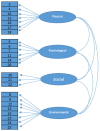Identifying the Psychometric Properties of the Malay Version of the WHOQOL-BREF among Employees with Obesity Problem
- PMID: 35742790
- PMCID: PMC9223816
- DOI: 10.3390/ijerph19127542
Identifying the Psychometric Properties of the Malay Version of the WHOQOL-BREF among Employees with Obesity Problem
Abstract
The Malay version of the WHOQOL-BREF was published approximately 15 years ago. Since then, no known research has been conducted to identify the psychometric properties of the scale using confirmatory factor analysis. This study aimed to establish a model by applying a scientific approach to the translation and adaptation method. The back translation technique was used for the translation process. This cross-sectional study involved 282 employees at Universiti Kebangsaan Malaysia. The instrument received satisfactory Cronbach's alpha reliability values. The data were analysed with SEM using AMOS. Results showed that the model produced is parsimonious, with CMIN/df = 0.23, CFI = 0.93, SRMR = 0.08, RMSEA = 0.08 and PCLOSE = 0.07. Adopting the Malay version of the WHOQOL-BREF for future research is highly recommended due to its properties.
Keywords: Malay translation; WHOQOL; back translation; obese employees; psychometric properties; quality of life.
Conflict of interest statement
The authors declare no conflict of interest.
Similar articles
-
Psychometric properties of the Chinese version of the WHOQOL-HIV BREF to assess quality of life among people living with HIV/AIDS: a cross-sectional study.BMJ Open. 2017 Aug 21;7(8):e016382. doi: 10.1136/bmjopen-2017-016382. BMJ Open. 2017. PMID: 28827253 Free PMC article.
-
Development and validation of the Asian Diabetes Quality of Life (AsianDQOL) Questionnaire.Diabetes Res Clin Pract. 2015 Jun;108(3):489-98. doi: 10.1016/j.diabres.2015.02.009. Epub 2015 Feb 28. Diabetes Res Clin Pract. 2015. PMID: 25790899
-
Cross-Cultural Adaptation and Validation of the Malay Version of Sports Motivation Scale-II.Int J Environ Res Public Health. 2021 Nov 7;18(21):11694. doi: 10.3390/ijerph182111694. Int J Environ Res Public Health. 2021. PMID: 34770207 Free PMC article.
-
Cultural adaptation and validity of the Malay version of the brief psychiatric rating scale (BPRS-M) among patients with schizophrenia in a psychiatric clinic.BMC Psychiatry. 2017 Dec 2;17(1):384. doi: 10.1186/s12888-017-1553-2. BMC Psychiatry. 2017. PMID: 29197359 Free PMC article.
-
Psychometric Properties of the World Health Organization's Quality of Life (WHOQOL-BREF) Questionnaire in Medical Students.Medicina (Kaunas). 2019 Dec 4;55(12):772. doi: 10.3390/medicina55120772. Medicina (Kaunas). 2019. PMID: 31817180 Free PMC article.
Cited by
-
The quality of life and body image disturbances of Turner syndrome patients in Malaysia: a cross-sectional study.BMC Womens Health. 2023 Nov 17;23(1):614. doi: 10.1186/s12905-023-02745-x. BMC Womens Health. 2023. PMID: 37978374 Free PMC article.
-
Mental Health and the COVID-19 Pandemic: Observational Evidence from Malaysia.Int J Environ Res Public Health. 2023 Feb 24;20(5):4046. doi: 10.3390/ijerph20054046. Int J Environ Res Public Health. 2023. PMID: 36901057 Free PMC article.
-
The relationship between childhood trauma and mental health status among Chinese vocational high school adolescents: the mediating effect of poor self-control and internet addiction.BMC Public Health. 2024 Oct 9;24(1):2747. doi: 10.1186/s12889-024-20271-9. BMC Public Health. 2024. PMID: 39379860 Free PMC article.
-
Effectiveness of Adaptation of a Resilience-Building Intervention Among Individuals With Adverse Childhood Experience: Protocol for a Randomized Controlled Trial.JMIR Res Protoc. 2025 Feb 12;14:e56826. doi: 10.2196/56826. JMIR Res Protoc. 2025. PMID: 39938084 Free PMC article.
References
-
- Lodhi F.S., Montazeri A., Nedjat S., Mahmoodi M., Farooq U., Yaseri M., Holakouie-Naieni K. Assessing the quality of life among Pakistani general population and their associated factors by using the World Health Organization’s quality of life instrument (WHOQOL-BREF): A population based cross-sectional study. Health Qual. Life Outcomes. 2019;17:1–17. doi: 10.1186/s12955-018-1065-x. - DOI - PMC - PubMed
-
- Balchin C., Tan A.L., Wilson O.J., McKenna J., Stavropoulos-Kalinoglou A. Participation in physical activity decreased more in people with rheumatoid arthritis than the general population during the COVID-19 lockdown: A cross-sectional study. Rheumatol. Int. 2022;42:241–250. doi: 10.1007/s00296-021-05054-4. - DOI - PMC - PubMed
Publication types
MeSH terms
LinkOut - more resources
Full Text Sources
Medical
Miscellaneous


